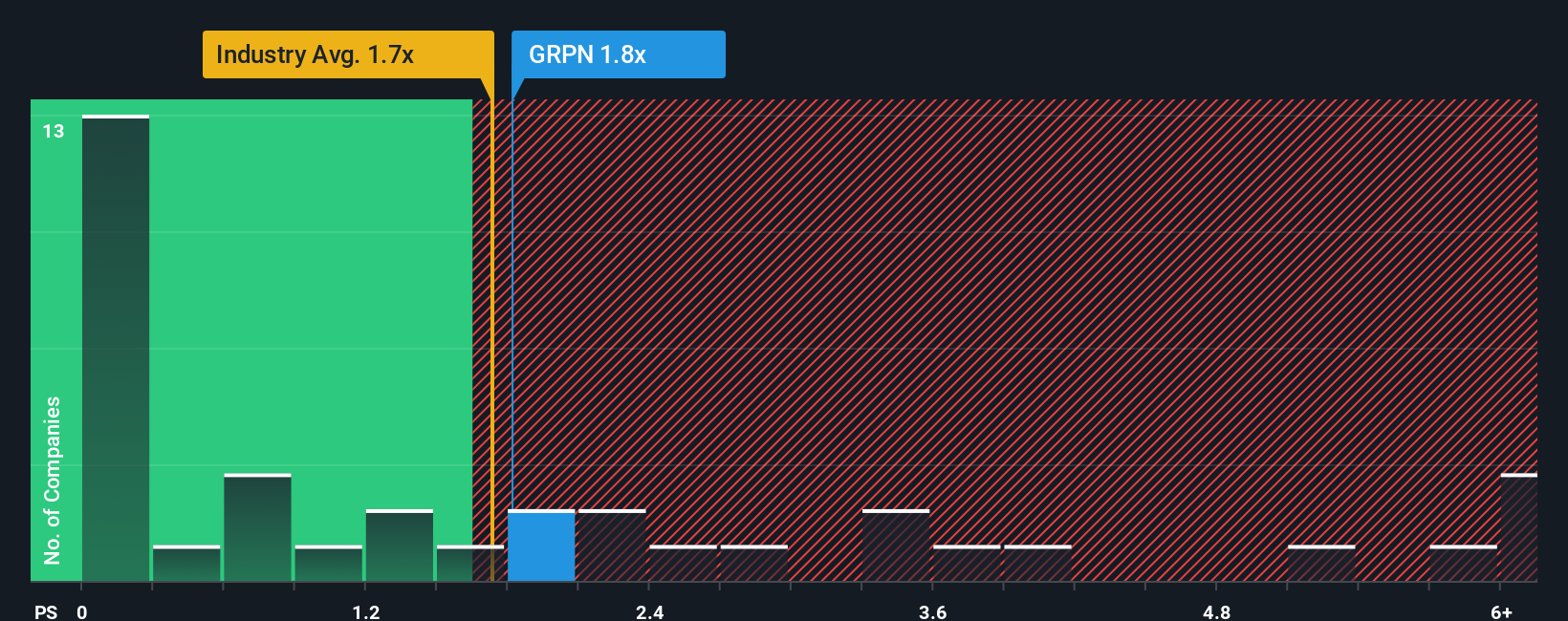- United States
- /
- General Merchandise and Department Stores
- /
- NasdaqGS:GRPN
Groupon, Inc. (NASDAQ:GRPN) Stock's 26% Dive Might Signal An Opportunity But It Requires Some Scrutiny
Unfortunately for some shareholders, the Groupon, Inc. (NASDAQ:GRPN) share price has dived 26% in the last thirty days, prolonging recent pain. Looking at the bigger picture, even after this poor month the stock is up 86% in the last year.
In spite of the heavy fall in price, there still wouldn't be many who think Groupon's price-to-sales (or "P/S") ratio of 1.8x is worth a mention when the median P/S in the United States' Multiline Retail industry is similar at about 1.7x. However, investors might be overlooking a clear opportunity or potential setback if there is no rational basis for the P/S.
View our latest analysis for Groupon

What Does Groupon's P/S Mean For Shareholders?
Groupon hasn't been tracking well recently as its declining revenue compares poorly to other companies, which have seen some growth in their revenues on average. Perhaps the market is expecting its poor revenue performance to improve, keeping the P/S from dropping. If not, then existing shareholders may be a little nervous about the viability of the share price.
Keen to find out how analysts think Groupon's future stacks up against the industry? In that case, our free report is a great place to start.Is There Some Revenue Growth Forecasted For Groupon?
In order to justify its P/S ratio, Groupon would need to produce growth that's similar to the industry.
In reviewing the last year of financials, we were disheartened to see the company's revenues fell to the tune of 4.7%. This means it has also seen a slide in revenue over the longer-term as revenue is down 34% in total over the last three years. So unfortunately, we have to acknowledge that the company has not done a great job of growing revenue over that time.
Looking ahead now, revenue is anticipated to climb by 14% per annum during the coming three years according to the three analysts following the company. Meanwhile, the rest of the industry is forecast to only expand by 11% per year, which is noticeably less attractive.
In light of this, it's curious that Groupon's P/S sits in line with the majority of other companies. It may be that most investors aren't convinced the company can achieve future growth expectations.
The Final Word
Following Groupon's share price tumble, its P/S is just clinging on to the industry median P/S. We'd say the price-to-sales ratio's power isn't primarily as a valuation instrument but rather to gauge current investor sentiment and future expectations.
Looking at Groupon's analyst forecasts revealed that its superior revenue outlook isn't giving the boost to its P/S that we would've expected. There could be some risks that the market is pricing in, which is preventing the P/S ratio from matching the positive outlook. At least the risk of a price drop looks to be subdued, but investors seem to think future revenue could see some volatility.
A lot of potential risks can sit within a company's balance sheet. Our free balance sheet analysis for Groupon with six simple checks will allow you to discover any risks that could be an issue.
If strong companies turning a profit tickle your fancy, then you'll want to check out this free list of interesting companies that trade on a low P/E (but have proven they can grow earnings).
New: Manage All Your Stock Portfolios in One Place
We've created the ultimate portfolio companion for stock investors, and it's free.
• Connect an unlimited number of Portfolios and see your total in one currency
• Be alerted to new Warning Signs or Risks via email or mobile
• Track the Fair Value of your stocks
Have feedback on this article? Concerned about the content? Get in touch with us directly. Alternatively, email editorial-team (at) simplywallst.com.
This article by Simply Wall St is general in nature. We provide commentary based on historical data and analyst forecasts only using an unbiased methodology and our articles are not intended to be financial advice. It does not constitute a recommendation to buy or sell any stock, and does not take account of your objectives, or your financial situation. We aim to bring you long-term focused analysis driven by fundamental data. Note that our analysis may not factor in the latest price-sensitive company announcements or qualitative material. Simply Wall St has no position in any stocks mentioned.
About NasdaqGS:GRPN
Groupon
Operates a marketplace that connects consumers to merchants by offering goods and services at a discount in North America and international.
Undervalued with reasonable growth potential.
Similar Companies
Market Insights
Community Narratives



